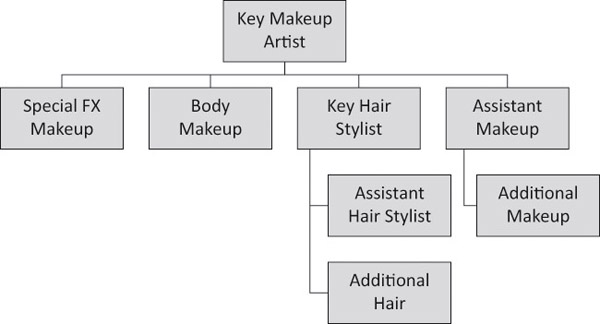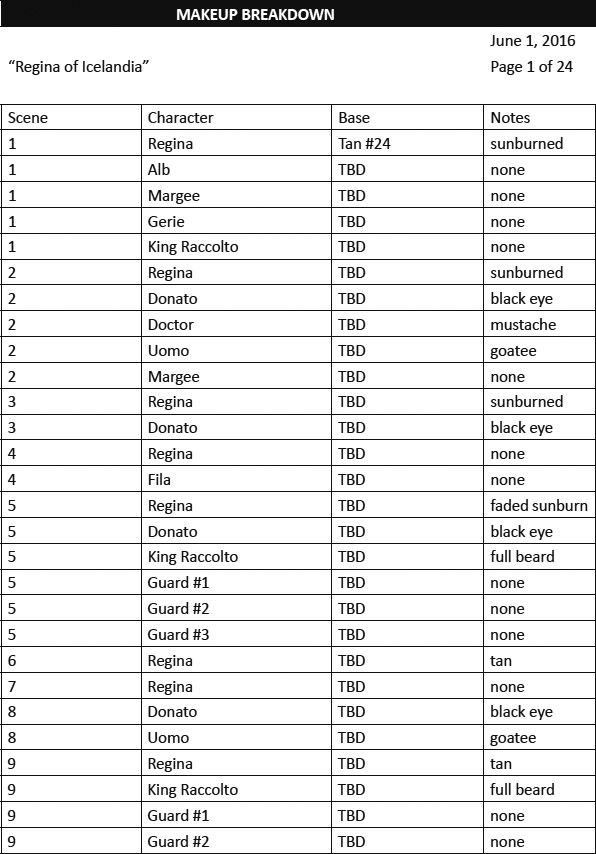14
Makeup and Hair
As discussed in Chapter 13, the wardrobe department is often recognized in either period films or films with outrageous looks, such as science fiction. However, it should be noted that all makeup is an art, even on shows where no special makeup is required. The makeup team on a project varies greatly depending on the budget and scope of the project. In low budget, you will most likely have one makeup artist who handles all makeup, hair, body, and special effects makeup for the entire cast. On a medium-size budget, you will most likely hire a key makeup artist, key hair, and a couple of assistants. On higher-budget shoots you could have all the personnel listed in this chapter and more. Many stars prefer to use their own hair and makeup people. These people are brought in and specifically do only the hair and makeup of the person they serve. I once worked a show where there were three leading women. Each one had her personal hair person flown in for the duration of the shoot. This chapter discusses the role of each person in the hair and makeup team. Figure 14.1 shows the makeup and hair hierarchy.
 Key Makeup
Key Makeup
As head of the makeup and hair department, the key makeup artist is in charge of the makeup and hair budget. Usually the key makeup artist will do makeup for the stars on a shoot. The assistants may then do actors in the supporting roles. The makeup person can start work for anywhere from one week, for simple shoots, to three months of pre-production, for more complex shoots requiring special effects. Following are the duties and responsibilities of the key makeup artist.
Pre-Production
- Writes and submits the makeup and hair budget.
- Meets with the director to discuss makeup requirements for each actor in each scene.
- Completes a makeup breakdown per character and scene. This breakdown changes as each actor is hired. For instance, the first breakdown notes any special makeup considerations. As each actor is hired, the breakdown gets more specific. This is because once the makeup artist knows who the actor is, she can decide on which makeup to use. Once all actors are cast and each makeup choice is made, the makeup artist will complete the breakdown for every actor, according to scene (see Figure 14.2).
- Contacts actors and reviews color photographs to determine proper makeup for each actor.
- Orders makeup for each actor.
- May supervise makeup tests, if needed.
- Hires makeup assistants.
- Meets with the key hair person to discuss each actor’s look.
- Determines additional makeup personnel needs for large cast days.
Production
- May complete makeup on stars.
- Never leaves set, or makes sure a makeup representative is always on set.
- Supervises all makeup continuity on set.
Wrap
- Makes sure all rentals are returned to their vendors.
- Wraps out the budget with the accounting office.
 Other Makeup Personnel
Other Makeup Personnel
The assistant makeup artist answers directly to the key makeup artist. He will also do makeup for some supporting actors and day players. In addition, the assistant makeup person may need to stand by on set if the key makeup artist has to work on another actor. This assistant may have some pre-production work, depending on how involved the makeup for the show is, or may begin work on the first day of principal photography.
Additional makeup artists, also known as extra makeup, are used when there is a large cast on set. This situation may take place for only one or two days, or may continue for weeks. In pre-production the key makeup artist will look at the production schedule and determine when additional makeup artists are needed. These additional artists are then hired only for the duration of the time when the large cast is shooting.
Body makeup is used when a scene requires an actor to be partially or fully nude. In other words, the key makeup artists handle the face, neck, and hands of an actor, and a body makeup artist handles the rest. There are a few exceptions to this. Let us say an actor has to wear a bikini in one scene, but that is the only time the actor will be seen this way. It is more cost-efficient to have an assistant handle the body makeup than pay to fly a body makeup artist in for one scene. You may have an actor who prefers using someone they know. The choice to use that person is usually outlined in an actor’s contract.
The special effects makeup artist is used when an actor needs to have bullet wounds, bleeding, sores, growths, or prosthetics. Prosthetics in films can be items such as a larger nose, an aged look, or an entire facial mask (e.g., if the character is an alien, a werewolf, or some other creature). Sometimes, minor special effects makeup is taken care of by the key makeup artist. However, if the shoot requires extensive special effects makeup, a separate person is hired, either for run of show or for the duration the special effects are needed. If the special effects person is run of show, he would most likely have enough effects to warrant a team of assistants and would begin work anywhere from one to four months in pre-production.
- Meets in pre-production with the key makeup artist and director to discuss effects.
- Orders any fake blood or prosthetics as needed.
- May manufacture prosthetics as needed.
- May meet with actors to fit them for prosthetics, if applicable.
- Works with the 1st AD to discuss how much time each makeup effect will require to prepare.
- In pre-production, may practice new techniques if there are any unusual effects.
- Stands by on set to supervise each effect.
- May hire assistants as needed.
 Key Hair
Key Hair
Doing hair for actors can be as simple as putting someone’s hair into a ponytail or as involved as applying a prosthetic that makes someone look bald. The key hair stylist is responsible for all hair on all actors of a project. She works directly with the key makeup artist to keep hair and makeup costs on budget. The key hair person will begin work anywhere from a week to a month or more in pre-production, depending on whether or not there are a lot of wigs or special appliances that need to be manufactured or rented.
Pre-Production
- Meets with the director to discuss looks as people are cast.
- May supervise hair tests.
- Constructs a hair breakdown.
- May order wigs or hairpieces as needed.
- Contacts actors and reviews color photographs to determine the look for each actor.
- Hires hair assistants.
- Meets with the key makeup person to discuss each actor’s look.
- Determines additional hair personnel needs for large cast days.
Production
- Completes hair on stars.
- Never leaves set, or makes sure a hair representative is always on set.
- Supervises all hair continuity on set.
Wrap
- Makes sure all wigs or hair appliances are returned.
- Makes sure all accounting for the hair budget is complete.
 Assistant Hair/Additional Hair/Extra Hair
Assistant Hair/Additional Hair/Extra Hair
As with assistant makeup, the assistant hair people support the key hair person and will usually begin work on the first day of principal photography. The exception to this, for example, would be if there are a large number of wigs or tests in pre-production. In this case the key hair person may need assistance to get ready for the first day of shooting. Any additional hair people are used only on days when a large cast is required.
 Operations
Operations
During pre-production the makeup and hair team prepares all wigs, hairpieces, and special effects that will be required for the shoot. Makeup and hair artists have their own organizational strategy, but each will follow the production schedule in order to have the proper makeup or hair needs ready for at the right time. On the day of the shoot, the makeup team pulls out the proper makeup for the first actors of the day. The actor or actors are brought to makeup by either a set PA or the 2nd AD. Once the actor’s makeup is completed, the actor is turned over to the hair person. Once the hair person is done, the actor is escorted to wardrobe by the set PA or 2nd AD. This process continues throughout the day until all actors have completed initial makeup and hair.
As with the wardrobe department, as soon as the first actor is taken to set, a representative from the team is always standing by on set to do touch-ups between takes. The key makeup or hair person or an assistant, depending on which actor is on set, may do touch-ups. It is the on-set person’s responsibility to make sure that makeup and hair continuity is maintained and that the actor looks appropriate. After the director cuts a shot, the director may move in to give further direction. The makeup or hair person has to be sensitive not to interfere with the director’s work. After the director is done, the makeup or hair person may have only seconds to jump in and do touch-ups. The touch-up should never hold up shooting. Hair and makeup are expected to get in and out before the next shot is called.
Qualities of a Good Hair and Makeup Team
- Extremely creative, able to put the director’s vision on-screen.
- Can do their job quickly, without loss of quality.
- Has extensive knowledge of makeup, hair, and the proper hygiene required to work with these items safely.
- Able to work well with particular actors and their proclivities.
A note on proper hygiene: In low budget, where lack of money dictates a lot on set, the one area that people sometimes skimp on is makeup. I have seen some makeup artists use the same makeup, sponges, and other applicators for many actors. This practice is highly unsanitary. Safety managers, when employed, are trained to look at how the makeup team is functioning, in terms of health and safety standards. Make sure your makeup people have the funds to do their jobs safely.
 There’s an App for That!
There’s an App for That!
Both makeup and hair artists have access to apps that help them record each look they do on actors, through access to their phone cameras. In addition, the apps will allow them to make notes for each character, customizing their lists for continuity or organization.
 Summary
Summary
The makeup and hair team on a show could be made up of one person or many people, depending on your budget and the complexity of your show. Some actors prefer to have their own personal hair and makeup people. If you are working in low budget, you will not be able to afford this luxury, but it is a common situation in high-budget projects. If your project contains a lot of special effects makeup, you may have to hire a separate makeup artist who specializes in effects. Finally, you want to make sure your hair and makeup team know sanitary makeup and hair practices to ensure the health and safety of your cast.


